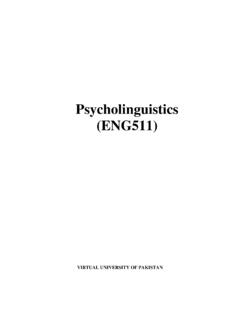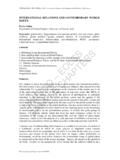Transcription of 2.3.6 Affective Domain
1 Faculty GuidebookFaculty Development SeriesSection Affective Domainby Wendy Duncan-Hewitt (Dean of Pharmacy, St. Louis College of Pharmacy), Cy Leise (Psychology & Human Services, Bellevue University), and Ann Hall (Allied Health Technologies, Sinclair Community College)The Affective Domain contains learning skills that are predominantly related to emotional ( Affective ) processes. The learning processes in the Affective Domain include being open to experience, engaging in life, cultivating values, managing oneself, and developing oneself (Table 1). Within each of these general process areas are several clusters of specific learning skills that can be improved by means of constructive intervention and assessment.
2 The classification of Affective skills presented in this module incorporates many of the skills described in Bloom s original work. Although these earlier authors and contemporary educators generally focus more on learning objectives, cognitive learning skills, or in some contexts, psychomotor skills, the movement to learner-focused teaching/learning methods makes clear the significance of integrating learner skills across all domains. Skills in the Affective Domain are strongly related to student buy-in, self-management, persistence, attitudes toward assessment, and level of success. The present classification provides a valuable reference for curriculum design, facilitation, and personal Importance of Affect in Human BehaviorAffect or emotion influences one s awareness of important sensory and situational changes, and motivates action.
3 One example is the well-known fight or flight response. The importance of affect in human and animal life is clearly demonstrated in the extensive body of theory and research related to emotion and motivation. Oatley (1992), Nesse (1990), and Lewis and Haviland (2004) are examples of a wide range of approaches to affect that include neuroscience, psychoanalysis, behavioral psychology, cross-cultural psychology, and evolutionary indication of the increasing attention paid to Affective skills is the work of Lopez and Snyder (2003), as described in their presentation of measurement options for positive psychology. Another is Goleman s (1997) popularization of the finding that emotional intelligence is often a better predictor of individual success than general intellectual ability as measured by most IQ who learn to recognize and engage their emo-tions are ready to grow affectively so that they can respond to challenges appropriately and explore their values.
4 At higher levels in the Affective Domain classifica-tion, growth involves managing oneself, managing one s performance, and making commitments. Maslow (1970) calls this self-actualization. Peterson and Seligman (2004) have prepared an important resource for the affec-tive Domain in their comprehensive scholarly review of what they refer to as character strengths and virtues in the categories of wisdom and knowledge, courage, human-ity, justice, temperance, and present classification emphasizes growable skills that tend to be a combination of emotion and motivation, sometimes referred to as conation. What ties all of the processes, clusters, and skills together is the emphasis on Affective skills that are commonly observed in learning and growth Role of Affect in LearningAlthough many educators develop effective affect management skills in their classrooms and other learning contexts, this is often a process of trial and error.
5 The assumption in this module is that Affective skills are universally important in learning and growth and that these skills can be facilitated equally as well as those in the other domains. Table 2 provides guidance for assessing the level of competency a learner has achieved with specific Affective learning skills. Learning in the cognitive, social, and psychomotor domains is often constrained if the learner is operating at a low level with key Affective skills. For example, a large group of learners who do not recognize the significance of taking charge of their own learning will reduce the level of discourse in a course. Even if a learning objective appears to be cognitive in nature, there will always be Affective skills involved.
6 For example, Halpern (1998), using a cognitive psychology perspective, emphasizes the importance of teaching transferable skills as the universal goal of effective teaching/learning. She illustrates this with a four-part critical thinking model that is empirically supported: students must be prepared for effortful cognition, there must be instruction in the skills of critical thinking, there must be training in the structure of problems and arguments, and meta-cognition is necessary for monitoring transfer of learning. The first component of her model is clearly related to the Affective Domain and includes aspects of a quality learning environment ( Methodology for Creating a Quality Learning Environment) such as establishing respect, buy-in, and an assessment mindset.
7 The second and third components are mostly related to cognitive Domain skills, but learners with more advanced social and Affective skills are more likely to persist with the difficult learning involved. While the fourth component involves advanced cognitive Domain learning skills, it also requires Affective skills related to persistence. When learning is considered in a systems perspective, there are many places where the level of growth in specific Affective skills will make the difference between calmly persisting in a cognitive task and bailing out due to frustration ( The Accelerator Model). It is essential, therefore, to incorporate techniques into facilitation plans to engage learners in ways that lead to active, self-challenging learning attitudes ( Creating a Facilitation Plan).
8 When learning attitudes like emotional control and objectivity are highly developed, they facilitate self-control, the deferral of gratification, stability, persistence, courage, and serenity. The Affective skills are essential if one is to care enough to put in the considerable time, effort, and discomfort that it takes to improve as a learner and to grow as a of the Affective DomainAffective Domain ProcessesAs illustrated in Table 1, the Affective Domain is comprised of five Affective processes. These processes are sequenced and identified as being open to experience (receiving), engaging in life (responding), cultivating values (valuing), managing oneself (organizing), and developing oneself (internalization).
9 The processes, which are increasingly more complex and integrative, parallel Maslow s hierarchy of needs, Bloom s taxonomy of educational objectives in the Affective Domain (Krathwohl, Bloom, & Mesia, 1964), and Mayer and Salovey s (1997) conceptualization of emotional intelligence. The process framework is intended to reflect the full range of Affective development because adults vary widely in this area. Individuals may need to address basic emotional issues that were put on hold earlier in life which now require growth. The higher levels of the framework reflect the Affective control and performance desired by wise, mature, and integrated Domain ClustersClusters of learning skills are identified under each of the Affective Domain processes.
10 As many as four clusters support each process area and each cluster contains up to seven unique learning skills. Skill clusters are named to communicate their role within each process area. The processes and skill clusters are listed in order of increasing complexity but there is no special order to the learning skills within a Domain SkillsThe Affective learning skills can be consciously improved with assessment and intentional practice; moreover, growth in these skills will enhance learning in skills in the other domains and for any learning goal. Each of the skills is described briefly to enhance its meaning to the reader. The set of over 80 learning skills identified in Table 1 are transferable, , they can be applied in a broad range of life situations.





